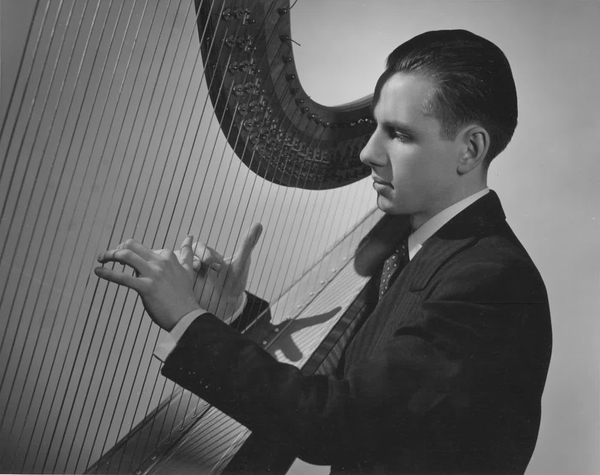On October 5, 2015, ICSOM lost one of its cofounders, Reinhardt Elster. The distinguished harpist, who performed everything from jazz to opera with many of the greatest musicians of the 20th century, died peacefully at his home in western Massachusetts after complications from a fall. He was 101.
Mr. Elster was born in Hammond, Indiana, on July 23, 1914, the only child of German and Swedish immigrants. His father was a semiprofessional musician who helped found the local union. “Musicians’ unions are in my blood,” Mr. Elster would later say.
Mr. Elster began his musical life as a pianist and percussionist. His first paid job was playing the organ at a roller-skating rink. He was a two-time national high school champion on marimba-xylophone. He didn’t play the harp until he was 15, and only because his school bought one and offered him lessons.
His talent led him to the National Music Camp at Interlochen, where he twice won the student conducting contest; then to Curtis Institute, where he studied with Carlos Salzedo; then, during the Depression, to a stint as music director of radio station WHIP (nicknamed “We Hope It Pays”); and then, during World War II, to the Army Air Force Orchestra, which took him to New York City.
Mr. Elster freelanced in New York after the war, recording with the likes of Perry Como, Russ Case, Nat King Cole, and the NBC Symphony under Toscanini. He published his harp arrangements of “Donkey Serenade”, “Perfidia”, and “Frenesí”.

Photo courtesy of the Author
But soon a friend from Curtis, the flutist Harold Bennett, began needling him to audition for the Metropolitan Opera Orchestra. With reluctance (he was already a successful freelancer) he agreed and was promptly offered the position. With even more reluctance (because of the demands of the operatic repertoire) he took it.
From 1948 to 1986, Mr. Elster was principal harpist of the Met, and from 1968 to 1978, he was also the harpist for the Casals Festival Orchestra in Puerto Rico. It was a career filled with many grand moments and plaudits. Leonard Bernstein called him “a wonderful harpist.” James Levine marveled at his Tannhäuser. Pavarotti, Domingo, Sutherland, and Sills crooned to his lyre. And, accompanied only by Mr. Elster, Marilyn Horne wowed a gala audience with “I Dream of Jeannie With the Light Brown Hair”.
Mr. Elster’s involvement with ICSOM stemmed from a 1960 contract dispute at the Met, when he did research for the negotiating committee. He later helped draft principles for the organization, and in 1963 became the second editor of Senza Sordino.
“I knew that we were all up against management that thought we were just a bunch of dumb musicians who didn’t deserve respect,” Mr. Elster wrote in 2012. “As editor of Senza, I wanted to help build our nascent organization and have it be treated seriously.”
Note: Further information about Mr. Elster can be found in this MET Orchestra blog post.





